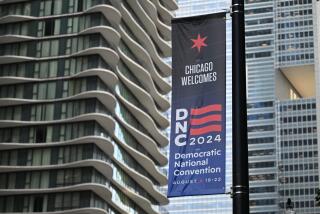PREVIEW / SOVIET PARTY CONGRESS : Power Base Is Heading for a Crucial Test : Communists seek a consensus to chart the nation’s future. They risk splitting into rival factions and further diminishing their clout.
MOSCOW — The Soviet Communist Party, led by General Secretary Mikhail S. Gorbachev, will open its first national congress since 1986 on Monday, with the party openly divided for the first time since the early years of Soviet power.
At the same time, its prestige is sliding just as Gorbachev’s reforms make it vital that Communists muster voter support to retain power or lose out to rival parties and political formations that are now legal.
The Issues
For the 4,683 elected delegates who convene in the Kremlin Palace of Congresses, the daunting goal will be to chart the future role of the party in fast-changing Soviet society, as well as shaping the internal machinery of the party itself, including revamping and possibly replacing supreme organs like the Politburo.
As a separate gathering of Communists from the Russian Federation, the largest Soviet republic, made clear this month, the glasnost- era congress will produce vociferous attacks on Gorbachev’s perestroika reforms from both radicals and orthodox Communists. Each member of the ruling Politburo could be called on to account for his tenure in office. In a secret-ballot election for party leader, direct challenges may be mounted to Gorbachev, who is also the Soviet president.
The congress, in theory the supreme institution of the 18-million-member party, also will be called upon to adopt a new party program and rules and could be the occasion for sweeping changes in personnel, from members of the Central Committee to the Politburo itself.
To allow Gorbachev to retain his place as party leader while freeing him from most operational duties, a party chairmanship with fewer responsibilities may be created.
The Background
Unlike in Eastern Europe, no other group in Soviet society comes close to having the clout and the experience in government of the party once headed by V. I. Lenin.
But political changes engineered by Gorbachev have forced Communists to seek new ways of exercising authority. If the party does not adapt, Gorbachev warned recently, “it will find itself on the sidelines of history.”
He wants party organizations all the way from Moscow to the villages of Siberia to get out of running the day-to-day affairs of the country and set strategic and ideological goals instead. He also wants to retain a unified national party apparatus, but to grant more leeway to Communists in the constituent Soviet republics to decide local affairs.
The party, now losing members and linked by many Soviet people to the bloody terror of Josef Stalin and the official corruption of the Brezhnev era, is conscious that both it and society as a whole are in crisis, or something near it.
According to Pravda, the party’s chief newspaper, more than half of a group of citizens surveyed in June did not consider the party the leading force in Soviet life.
Ideological factions have also appeared to doom the “monolithic Leninism” of the past, and the congress will be an arena where the 100 delegates who are members of the radical Democratic Platform group can wage ideological war on the ultra-orthodox Marxist faction, or the more mainstream delegates who support the Gorbachev line.
The Personalities
Gorbachev will undoubtedly occupy center stage at the congress, as he has in Soviet political life as a whole since becoming party chief. But there are indications that all 12 members of the Politburo will be individually open to criticism from the floor after each reports on his work.
Yegor K. Ligachev, the leading Politburo conservative, who recently questioned the wisdom of Gorbachev’s “regulated market” economic reforms, has specifically said he welcomes the opportunity to speak. The congress should also resolve the political fates of Politburo members such as Lev N. Zaikov, 67, the onetime Moscow party boss, and Vitaly I. Vorotnikov, 64, who did not even try to contest maverick Communist Boris N. Yeltsin’s successful attempt to succeed him as president of the Russian Federation.
Scenarios
There are several possible outcomes of the congress:
The party reaches critical mass, and Democratic Platform and ultra-right delegates walk out to form alternative parties also laying claim to the Communist label, further fracturing Gorbachev’s original power base.
Through Gorbachev’s personal diplomacy and intentional vagueness in party pronouncements, a broad enough ideological umbrella is found to prevent an open split among Communists, even if individual delegates walk out to protest what they claim is a veering to the left or right.
Gorbachev relinquishes the job of general secretary of the party to focus on his presidential duties, but is named to the new party chairmanship and names a progressive ally to take charge of the party’s day-to-day affairs.
More to Read
Sign up for Essential California
The most important California stories and recommendations in your inbox every morning.
You may occasionally receive promotional content from the Los Angeles Times.










